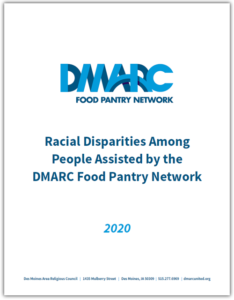Making DMARC a More Equitable Organization
 by Matt Unger, Chief Executive Officer
by Matt Unger, Chief Executive Officer
At DMARC, one of the foundational pillars of our Food Pantry Network is equitable access to food. We believe that if you need food, you should be able to get the same kind of food, the same quality, and the same amount, no matter where you live in the metropolitan area. By fundraising throughout the metro and by being able to move food around the area, DMARC is able to ensure that people living in lower-income areas have the same access to good food as do people living in wealthier areas.
But the murder of George Floyd last summer and the ensuing calls for racial justice on a systemic level prompted DMARC to renew and expand our focus on equity, not just in providing equitable access to food, but ensuring that our organization is contributing to a more equitable community in all that we do. We established an Equity & Inclusion Committee with members of our staff to focus on the following three areas as they relate to equity and our work: education, policies and procedures, and partnerships. We are happy to share the progress that this committee has made so far.
Educating Ourselves
In order to expand our understanding of how we can create a more equitable organization and community, it is important that we commit to learning more about the implicit biases we all have as individuals as well as the systemic inequities of our society.
Last summer, DMARC staff and board members underwent a two-part implicit bias training to help us recognize some of our own biases and learn how we can work on addressing them. Our staff and board also participated in the United Way of Central Iowa’s 21-Day Equity Challenge, and reflected together on what we learned.
We have committed to ongoing monthly educational sessions to learn from other organizations and individuals doing work in our community. So far, we’ve learned about the important work Proteus, Inc. engages in with migrant farmworkers, the One Economy Report and the disparities Black residents face in Greater Des Moines, and the work of the Des Moines Civil and Human Rights Commission.
Re-evaluating Policies and Procedures
We examined our organization’s policies and procedures to evaluate whether they contribute to a more or less equitable organization and community and made necessary changes.
We implemented the following changes to our hiring process:
- Including salary ranges on all job postings
- Working with a third party to remove names during initial screenings of job applications to limit bias
- Reviewing how our job descriptions are written and re-evaluating which physical and mental requirements are truly necessary for each position
We created a Food Pantry Equity Committee with representation from our food pantry partners to work on the following:
- Revised our ID policy to encourage, but not require, photo IDs for every member of a household to receive the full amount of food available
- Developing a food pantry visitor’s “bill of rights” to clearly outline the expectations of respect and customer service our food pantry visitors are to receive, and how food pantry visitors can lodge a formal complaint when they feel they have not been treated with respect
Forging New Partnerships
At DMARC, relationships and partnerships are absolutely vital to the work we do, both with our interfaith engagement efforts and in the fight against food insecurity. But too often we can fall into a routine of working with the same people and organizations we trust rather than reaching out and making connections with groups with which we’re unfamiliar.
That’s why we are being intentional about creating meaningful connections and partnerships with individuals and groups we do not currently have strong relationships with. We hope these new partnerships will ensure we are meeting the food needs of everyone in our community and will provide opportunities to collaborate on projects and advocate together for a more equitable Greater Des Moines.
Recognizing Racial Disparities in Food Insecurity
Racial disparities in food insecurity and other intersecting issues of poverty are still prevalent in our nation, state, and local community. We must all work together to find equitable solutions to food insecurity in Greater Des Moines, and one of the first steps in that process is acknowledging disparities as they exist today. Then, we need to start broadly exploring why that is – as individuals, organizations, a community and a state.

